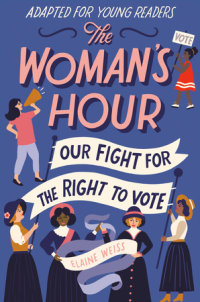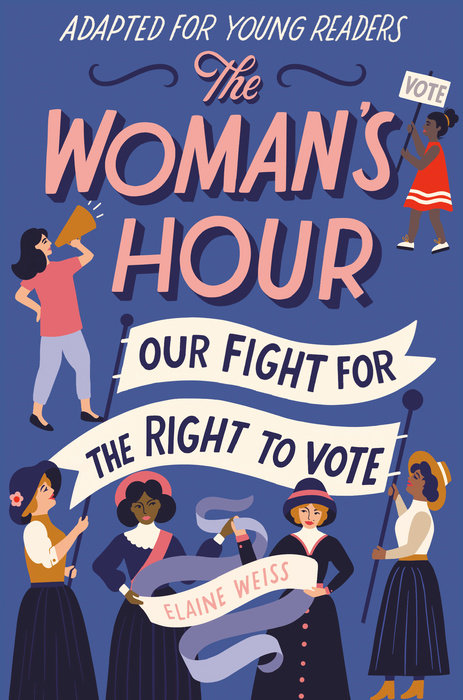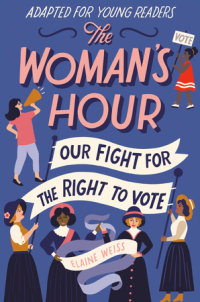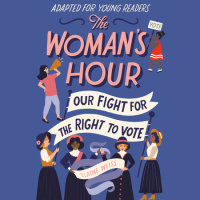The Woman's Hour (Adapted for Young Readers)
This adaptation of the book Hillary Clinton calls "a page-turning drama and an inspiration" will spark the attention of young readers and teach them about activism, civil rights, and the fight for women's suffrage--just in time for the 100th anniversary of the ratification of the Nineteenth Amendment. Includes an eight-page photo insert!
American women are so close to winning the right to vote. They've been fighting for more than seventy years and need approval from just one more state.
But suffragists face opposition from every side, including the "Antis"--women who don't want women to have the right to vote. It's more than a fight over politics; it's a debate over the role of women and girls in society, and whether they should be considered equal to men and boys.
Over the course of one boiling-hot summer, Nashville becomes a bitter battleground. Both sides are willing to do anything it takes to win, and the suffragists--led by brave activists Carrie Catt, Sue White, and Alice Paul--will face dirty tricks, blackmail, and betrayal. But they vow to fight for what they believe in, no matter the cost.
An Excerpt fromThe Woman's Hour (Adapted for Young Readers)
1 The Chief
Carrie Chapman Catt had spent the whole day sitting on a train, clattering over a thousand miles from New York City to Nashville, Tennessee. In the hours she wasn’t reading field reports and legal documents, rimless eyeglasses perched on her nose, she was skimming the newspapers and sneaking in a few pages of a detective novel--she couldn’t help it. Carrie loved a good mystery. She--the president of the National American Woman Suffrage Association (NAWSA), Susan B. Anthony’s heir, the woman the suffragists called “the Chief”--had been called one last time to lead the fight to give women the vote. At least, she really hoped this would be the last time.
Her hair was silver and wavy now, but she had retained the sly smile, piercing blue eyes, and arched eyebrows that had always made her look either amused or annoyed depending on her mood. And she definitely wasn’t amused this evening as her train rattled toward Tennessee in the dusky twilight of July 17, 1920. She was just plain worried.
Carrie’s life’s mission was to fight for freedom. American women still didn’t have the most basic right of democracy: the vote. For more than seventy years--ever since the first women’s rights meeting in Seneca Falls, New York, in 1848--generations of her suffrage sisters had faced public scorn as they campaigned, marched, and pleaded for their simple right to vote.
Now, finally, woman’s suffrage was within sight.
The Tennessee legislature would be called into special session in a few weeks. Legislators--all men, of course--would gather to vote on ratifying the Nineteenth Amendment. If they ratified it, it would enter the U.S. Constitution and become the law of the land.
The Nineteenth Amendment was just one simple sentence, stating that a citizen’s right to vote could not be denied on account of sex. Nothing revolutionary, according to Carrie Catt. It was only what she thought women--citizens of the United States--truly deserved.
A year earlier, in June 1919, the amendment had finally been pushed through both houses of the U.S. Congress after forty whole years of delay. Carrie had been overjoyed--and relieved--when that news arrived.
But passing through Congress was just the first step. The amendment then moved to the states for ratification. Carrie knew it would be a tough fight: suffragists had to convince at least thirty-six state legislatures to accept the amendment. By July 1920, thirty-five states had ratified the amendment. Nine had rejected it. Three were refusing to even consider it.
That left only Tennessee as a possible thirty-sixth state--the very last state needed to make American women’s dreams of voting come true.
If the Suffs could only persuade the Tennessee legislature to pass the amendment, woman’s suffrage would become American law. That meant every woman, in every state, would get to vote in every single election. That included local elections--like those for mayors, governors, and senators--as well as the election of the nation’s president. It would spell victory at last--and just in time for the presidential election in a few months.
That is, assuming the suffragists could convince the state of Tennessee to support their cause.
Carrie’s young assistant, Marjorie Shuler, had already arrived in Nashville to see what the Suffs were up against. Marjorie had met with the Tennessee suffrage leaders, talked to politicians, skimmed the newspapers, and eavesdropped on talk in the hotel lobbies. It hadn’t taken her long to realize that Nashville was a hornet’s nest. Word had it that the legislature was corrupt and that these politicians could be easily bribed. Plus, the governor, Albert Roberts, was caught in a nasty fight to hold on to his job and win his next election. Getting all tangled up with the amendment’s ratification was the last thing he wanted to do.
Marjorie wasn’t optimistic about the fight in Tennessee. She had sent a wire to NAWSA headquarters in New York that read, “Regard outlook hopeless under present conditions.”
Carrie had bought her ticket to Nashville as soon as she received that message. For the past two weeks, she’d given her suffragist peers stern directions, warning them to get ready for an ugly fight: “The Anti-Suffs will flood Tennessee with the most outrageous literature it has ever been your lot to read,” she told them, drawing from her experience in the other southern states. “It will contain outright lies, innuendoes, and near truths, which are more damaging than lies.” Furthermore, she added, the race issue would be “put forth in the ways to arouse the greatest possible prejudice.”
Carrie had been battling for woman’s suffrage for so long. As her train sped past rural, tree-lined landscapes, she could still feel the sting of the very first time she had confronted injustice. Back then, she hadn’t yet known women’s rights was a “Cause” she could fight for.
Carrie grew up a pigtailed Iowa farm girl, curious and a bit of a bookworm. She often borrowed her father’s newspapers, and she liked to chime in when her parents talked politics at the dinner table. Carrie’s mother, especially, was well read and informed about so many important topics. Carrie wanted to be just like her.
But on Election Day 1872, with Ulysses Grant facing off against newspaper publisher Horace Greeley for the seat in the White House, thirteen-year-old Carrie had watched, confused, as her father prepared to ride into town to vote for the president while her mother remained home.
Shouldn’t you be getting ready to go vote with the other grown-ups? Carrie had asked her mother. The whole family laughed. She still remembered the embarrassment, the hot tears welling up. Women weren’t allowed to vote, her father explained, as if it were the most obvious thing in the world. Only men were allowed. Voting was much too important to be left to women!
Carrie was immediately angry: her mother knew as much about the candidates and the “important” issues as her father did, maybe even more! She deserved to vote for the president, too. And, worst of all, this meant that one day Carrie wouldn’t be allowed to vote, either. Carrie didn’t take kindly to rules that made it seem she was less important, less smart, or less capable than boys were. Those rules weren’t fair.
So Carrie dedicated her life to changing the laws that barred women from voting. She became the famous leader of a giant army: nearly two million women and men were members of local NAWSA groups. Millions more were supporters of their movement. They all looked up to Mrs. Carrie Catt.
The train conductor called the next stop as Carrie flipped a newspaper open on her lap. She sighed as she read headline after headline spelling bad news. The country was facing a number of problems, and the entire world was still struggling to rebuild two years after World War I had ended. Seventeen million people had been killed in the war. And though many had hoped the end of the war would finally bring peace, Russia was invading Poland and advancing across Eastern Europe. Ottoman Turks were fighting the Greeks while continuing to massacre Armenians. Irish and British troops were fighting. Mexico was spiraling into civil war. A famine was spreading through China.
And on the home front, things were worse than before the war had begun! Underpaid steel mill, coal, railroad, and shipbuilding workers were striking all over the country. Acts of racism were increasing in many cities. Protests erupted in response. And throughout the whole country, the economy was faltering. People were having trouble making ends meet.
To top it all off, the U.S. Senate had recently rejected President Woodrow Wilson’s plan to join the League of Nations to settle international disputes. Carrie thought the league was the only good thing to come out of the horrible war. It was an opportunity to bring countries together in the name of peace. Carrie believed in world peace as much as she believed in freedom. She’d written and spoken in favor of the League of Nations--the backlash against it disgusted her.
Despite all her hard work, Carrie knew that change only happened really slowly. She had hung a large “Suffrage Map” of the United States on the wall of her office. Different colors and patterns marked the types of suffrage available to women in each state. In some states, women were already able to vote in all elections; in others, they had “limited suffrage” and could vote only in certain types of elections, for school board or in other local elections. Colored in black on the map were the states where women couldn’t vote at all. The federal amendment was the only way to change the election laws in every state at once--and change the entire map into an amazing, uniform design.
Carrie’s train pulled into the station at about half past eight that Saturday evening. Reporters swarmed her as she made her way to the Hotel Hermitage. “Suffrage supporters feel certain that Tennessee will rise to the occasion and use its decisive vote for the women,” Carrie told them confidently. “The eyes of the country and the world are centered here at Nashville.” Carrie Catt was demonstrating the same brave, optimistic attitude that she encouraged the Tennessee Suffs to adopt--whether she believed it or not.
Soot was flying in through the train’s open windows, but Josephine Pearson had too much on her mind to care about dirtying her dress. She set her sharp eyes on the landscape ahead and tucked her wiry gray hair under her hat. Josephine couldn’t get to Nashville soon enough. Earlier that day, she’d received a telegram alerting her that Carrie Catt was coming to Tennessee. “Our forces are being notified to rally at once. Send orders--and come immediately.”
Josephine was the proud leader of the Tennessee Antis, formally known as the Tennessee State Association Opposed to Woman Suffrage. She was a professor, and had been giving lectures and writing articles on the topic for years. The summons to Nashville thrilled her. This was the Antis’ chance to destroy the woman’s suffrage amendment, once and for all.
Josephine was fifty-two years old, and all her training--college, graduate degrees, and her years as a teacher--had prepared her for this mission. She knew she was following God’s will. After all, the Bible said a woman’s place was in the home as wife and mother. What was the point in disturbing the peace of a home by giving a woman the right to vote? Tennessee men knew what was best for their wives and daughters and would protect them. Josephine felt there was no need to question the wisdom of the men in charge, or the laws they had created. A woman’s life was complicated enough, raising children, taking care of the home, supporting her husband--why add politics to the mix?
But Josephine wasn’t just concerned with what the Bible said about women. Giving women the right to vote could destroy the white southern way of life, she feared. After the Civil War and the mayhem of Reconstruction--when black men had been granted the right to vote (and some were even elected to office)--the southern states had finally, Josephine felt, suppressed black people with Jim Crow laws. But if all women were allowed to vote, that would have to include black women, too. Then Washington could demand that black men be allowed to vote, and that was totally unacceptable to her.
This would be Tennessee’s time to triumph. And, she prayed, Tennessee would uphold its traditions. With God’s help, the Antis would hold fast against the feminist epidemic sweeping the nation.
So, when the telegram had arrived late Saturday afternoon, it was with a sense of holy purpose and duty to the traditions of southern culture that Josephine Pearson had bought a one-way train ticket to Nashville.
The Hotel Hermitage in Nashville was a much grander hotel than Josephine might normally have chosen for herself. When she checked in at the front desk, she requested the cheapest room and, she added, to please make sure it was as far away from Mrs. Carrie Catt as possible. After Josephine plunked down her suitcases and splashed cool water on her face, she took a deep breath and dialed her allies around the country to sound the alarm: Mrs. Catt is here. Send help. We are under attack.
On the same evening in mid-July, Sue Shelton White was heading to Nashville. She and Alice Paul, the head of the National Woman’s Party, had been in Ohio before then. With banners and picket signs in hand, they had confronted the two men who wanted to be the next president of the United States: Governor James Cox was the surprise choice of the Democrats. The Republican candidate, Warren G. Harding, a senator from Ohio, was trying to play it safe with conservative policies. As her train approached the Nashville station, Sue White thought about each of the candidates. Both men seemed eager to please their constituents--but they were most likely unwilling to fight for the ratification of the Nineteenth Amendment. They would need to be convinced.
Sue White was by now, at age thirty-three, a veteran protester. Two years earlier, she’d left Carrie Catt’s mainstream suffrage organization to join the more radical Woman’s Party. Now Sue was one of Alice Paul’s trusted deputies at the party’s headquarters in Washington.
The Woman’s Party was filled with ambitious young women who could no longer tolerate their second-class citizenship. And they were willing to put up a fight for it. Alice Paul was their quiet, ferocious, confident leader. Alice was a great risk-taker. She was always at the front line of every protest. She wasn’t afraid of being arrested or threatened. As far as Alice could tell, the women of America had nothing to lose in the fight for freedom.
Sue White felt right at home in the radical Woman’s Party. She didn’t believe in behaving like a sweet southern lady, waiting around for men to give her rights. Quiet pleading and polite pleasantries didn’t suit her. Sue was a rebel--a radical--and she was proud of it! She’d even been arrested at a suffrage protest and held in jail.
“Regard outlook hopeless under present conditions”: Marjorie Shuler in Nashville to Mrs. Frank Shuler at NAWSA headquarters in New York City, Western Union Telegram, July 10, 1920, Catt Papers, Tennessee State Library and Archives, Nashville.
“The Anti-Suffs will flood Tennessee with the most outrageous literature”: Catt to Mrs. John Kenny, June 29, 1920, in Catt Papers, Tennessee State Library and Archives.
“Suffrage Map”: Versions of the suffrage map were published and displayed by both NAWSA and the Woman’s Party and appeared regularly in their publications: NAWSA’s Woman’s Journal/Woman Citizen and the National Woman’s Party’s Suffragist.
“Suffrage supporters feel certain that Tennessee will rise to the occasion”: “Nation Looks to Solons of State for Ratification,” Nashville Tennessean, July 18, 1920.
“Our forces are being notified to rally at once”: Josephine A. Pearson, “My Story: Of How and Why I Became an Antisuffrage Leader,” dated April 30, 1939, Josephine A. Pearson Papers, Tennessee State Library and Archives, microfilm reel #1.



